Explore effective relationship coaching strategies, assess challenges, and find the right coach to achieve your relationship goals with expert guidance.In today’s fast-paced world, maintaining healthy relationships can be a challenge, often leading individuals to seek guidance from a relationship coach. But with numerous coaches available, how do you choose the right one for your unique situation? This comprehensive guide will help you navigate the selection process, empowering you to make an informed decision that suits your specific needs. We will explore essential steps such as assessing your relationship challenges, researching various coaching styles, and identifying the key qualities to look for in a coach. Furthermore, we’ll discuss the importance of evaluating credentials, scheduling consultations, and setting clear goals for your coaching journey. Whether you’re navigating romantic relationships, family dynamics, or friendships, finding the right guide can be transformative. Let’s embark on this journey together, ensuring you find the perfect support to foster healthier connections and nurture your personal growth.
Assess Your Relationship Challenges Before Seeking Coaching
Before diving into the process of relationship coaching, it’s essential to clearly identify the specific challenges you and your partner are facing. This self-assessment not only prepares you for the coaching journey ahead but also helps in choosing a relationship coach who is best suited to your needs.
Begin by reflecting on the aspects of your relationship that require attention. Here are a few prompts to guide your assessment:
| Reflection Prompts | Considerations |
|---|---|
| Communication Issues | Are you and your partner struggling to express your feelings or understand each other? |
| Trust Problems | Do you feel insecure about each other’s fidelity or honesty? |
| Conflict Resolution | Do disagreements escalate frequently and lead to unresolved tension? |
| Life Changes | How have recent changes (like moving, job loss, or family issues) affected your relationship? |
| Overall Satisfaction | Are you both happy in the relationship, or do you feel disconnected? |
Once you have a clearer picture of your challenges, it allows for a more focused discussion when you start finding the right coach. A certified relationship coach with experience in your area of concern can provide tailored support and strategies. Remember to consider the coaching style that resonates with you both; each coach may approach relationship issues differently.
This foundational understanding of your challenges will not only streamline your search but also enhance the effectiveness of the coaching sessions, leading to more meaningful progress in your relationship.
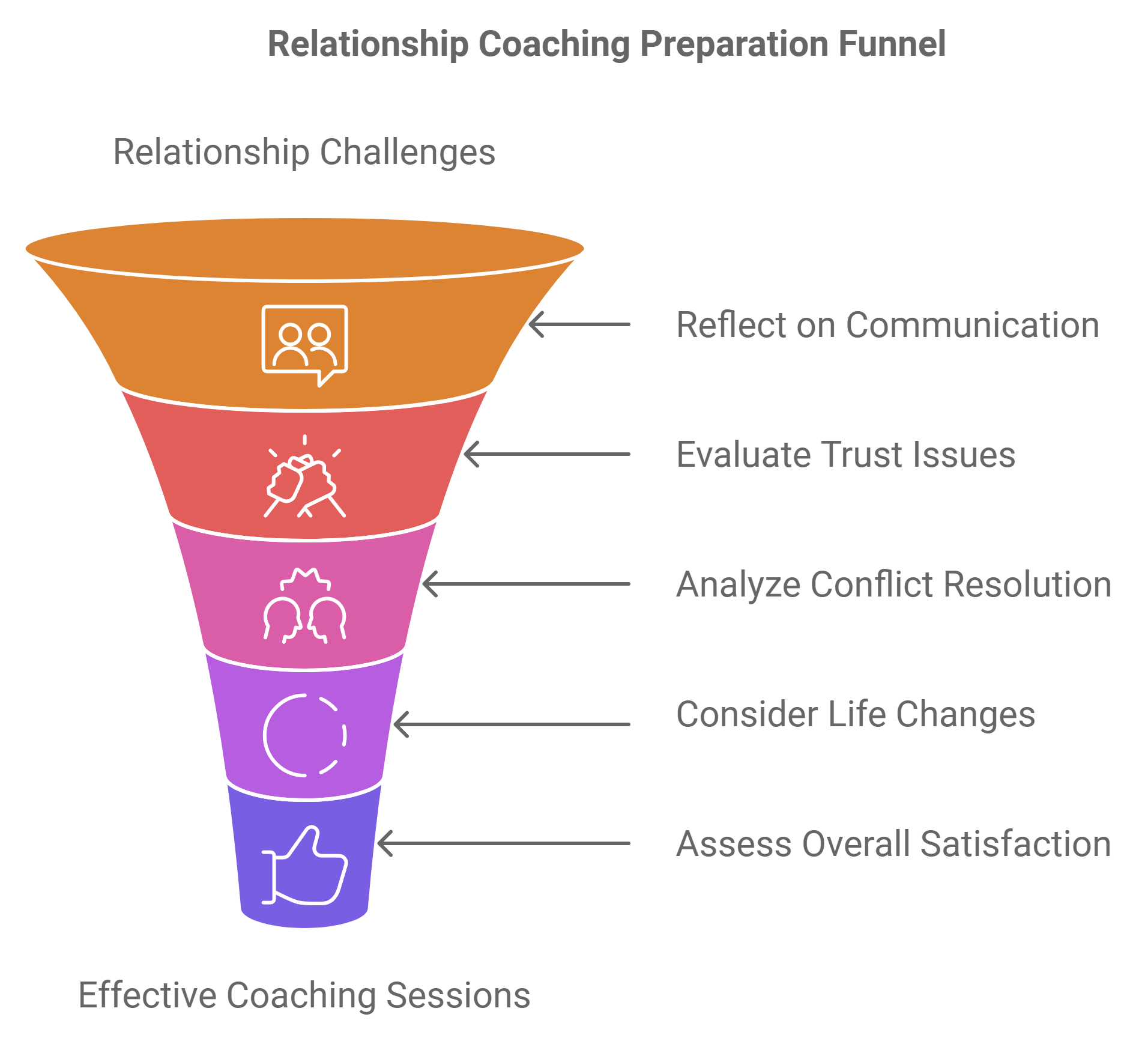
Research Different Types Of Relationship Coaching Available
When embarking on the journey of relationship coaching, it’s crucial to understand the various types of coaching available to ensure you find the right fit for your needs. Relationship coaching can differ significantly in approach, style, and focus, making it essential to narrow down what resonates with you. Here are some common types of coaching you might encounter:
- Individual Coaching: This type focuses on a single person and their relationship challenges, helping them develop personal insights and skills that can enhance their relationships.
- Couples Coaching: This involves working with both partners to address joint issues, improve communication, and strengthen their emotional connection.
- Pre-Marital Coaching: Aimed at couples planning to marry, this coaching helps partners prepare for the commitment by discussing important topics like finances, intimacy, and family dynamics.
- Divorce Recovery Coaching: For individuals navigating the aftermath of a breakup or divorce, this coaching helps them heal and regain confidence in future relationships.
- Specialized Coaching: Some coaches may specialize in specific areas such as intimacy issues, trust-building, or working with LGBTQ+ couples. Identifying these specialties can be beneficial in finding a certified relationship coach you resonate with.
By diligently researching these types, you can better match your coaching style and needs with the services offered, increasing your chances of achieving successful outcomes in your coaching journey. Remember, choosing a relationship coach requires thoughtful consideration of what you’re hoping to achieve through coaching. This groundwork will ultimately put you in a better position to engage effectively and make progress in your relationships.

Identify Qualities To Look For In A Relationship Coach
When it comes to relationship coaching, selecting the right coach is paramount for achieving desired outcomes in your personal life. Here are key qualities to consider when choosing a relationship coach:
| Quality | Description |
|---|---|
| Certified Relationship Coach | Look for a coach who has formal training and certification in relationship coaching to ensure they possess the necessary skills and knowledge. |
| Coaching Experience | Experience is crucial. A coach with a solid background in relationship coaching will have encountered a variety of relationship dynamics and challenges. |
| Coaching Style | Different coaches have varying styles. Some may take a more direct approach, while others may be supportive and empathetic. Consider what approach resonates with you. |
| Empathy and Listening Skills | A great coach should demonstrate genuine empathy and active listening skills to truly understand your relationship issues. |
| Flexibility | The ability to adapt their methods based on your unique needs is essential for effective relationship coaching. |
| Positive Track Record | Seek reviews or testimonials from past clients to gauge the coach’s effectiveness in helping others achieve their relationship goals. |
Choosing a coach with these qualities will set a solid foundation for your journey towards a healthier and more fulfilling relationship.
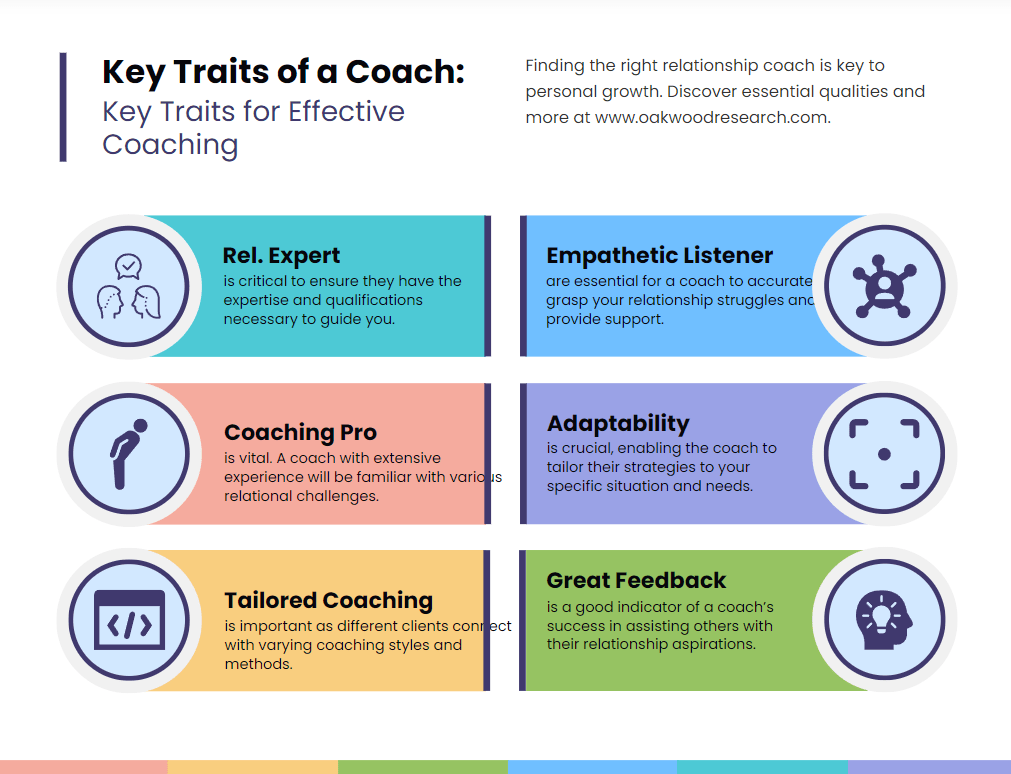
Evaluate Coaching Credentials And Experience Effectively
When it comes to relationship coaching, evaluating a coach’s credentials and experience is critical in ensuring you find the right fit. Here are some important factors to consider:
1. Credentials: A reputable certified relationship coach should have formal training from recognized institutions. Look for credentials such as certification from organizations like the International Coach Federation (ICF) or other specialized coaching programs. These certifications not only signify a level of expertise but also a commitment to ethical coaching practices.
2. Experience: Investigate the coach’s background and how long they have been practicing. Coaches with substantial coaching experience typically bring a wealth of knowledge and insights that can benefit your journey. Ask about the number of clients they have worked with and their success rates in addressing relationship coaching challenges.
3. Specialization: Some coaches may focus on specific areas within relationship coaching, such as marriage counseling or pre-relationship coaching. Identifying a coach’s specialization can help ensure that they meet your particular needs. When choosing a relationship coach, ensure that their expertise aligns with your relationship challenges.
4. Coaching Style: Each coach has a unique coaching style that may influence your experience. Take time to discuss their approach and methods during initial consultations. You want a style that resonates with you and feels comfortable, as this can significantly impact the effectiveness of your sessions.
5. Client Feedback: Always check for testimonials or references from previous clients. Positive feedback can provide insight into their coaching experience and the coach’s overall effectiveness in navigating similar relationship issues. By gathering feedback, you can make informed decisions about whether this coach is the right fit for you.
In summary, taking the time to evaluate coaching credentials and experience effectively when finding the right coach can make a significant difference in your relationship coaching journey. Prioritize credentials, experience, specialization, coaching style, and client feedback to ensure the best possible outcome for your relationship.
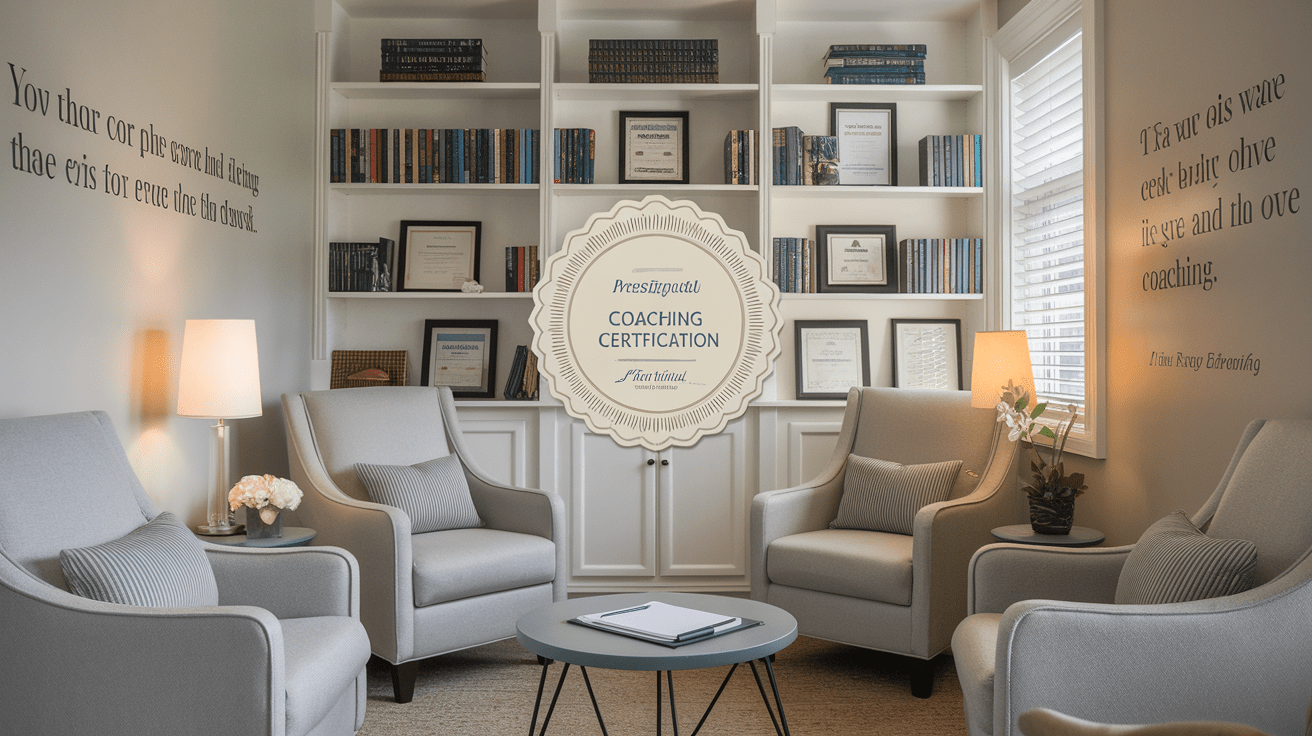
Schedule Initial Consultations To Gauge Compatibility
Scheduling initial consultations is a vital step when it comes to finding the right coach for your needs. The initial meeting provides an opportunity for you to assess whether the relationship coach is a good fit for you, both personally and professionally. Here are some key points to consider during these consultations:
Coaching experience matters. Inquire about their background and ask specific questions regarding their approach to relationship coaching. Understanding their coaching style will help you determine if it aligns with your expectations and goals.
Take note of their communication style during the consultation. Are they empathetic and supportive? Do they listen actively? Effective communication can make a significant difference in your coaching experience. A certified relationship coach should create an environment where you feel comfortable sharing your thoughts and feelings.
Observe how they respond to your specific relationship challenges. A good coach will not only provide guidance but will also tailor their methods to suit your unique situation. This alignment is essential for a fruitful coaching relationship.
Additionally, trust your instincts during the consultation. Ask yourself if you feel a genuine connection with the coach. Feeling at ease is crucial when choosing a relationship coach, as it sets the stage for open discussions and deeper insights.
Ultimately, the initial consultations will help you decide if this coach is the right partner on your journey to improve your relationships. By carefully gauging compatibility, you lay a strong foundation for success in your relationship coaching journey.
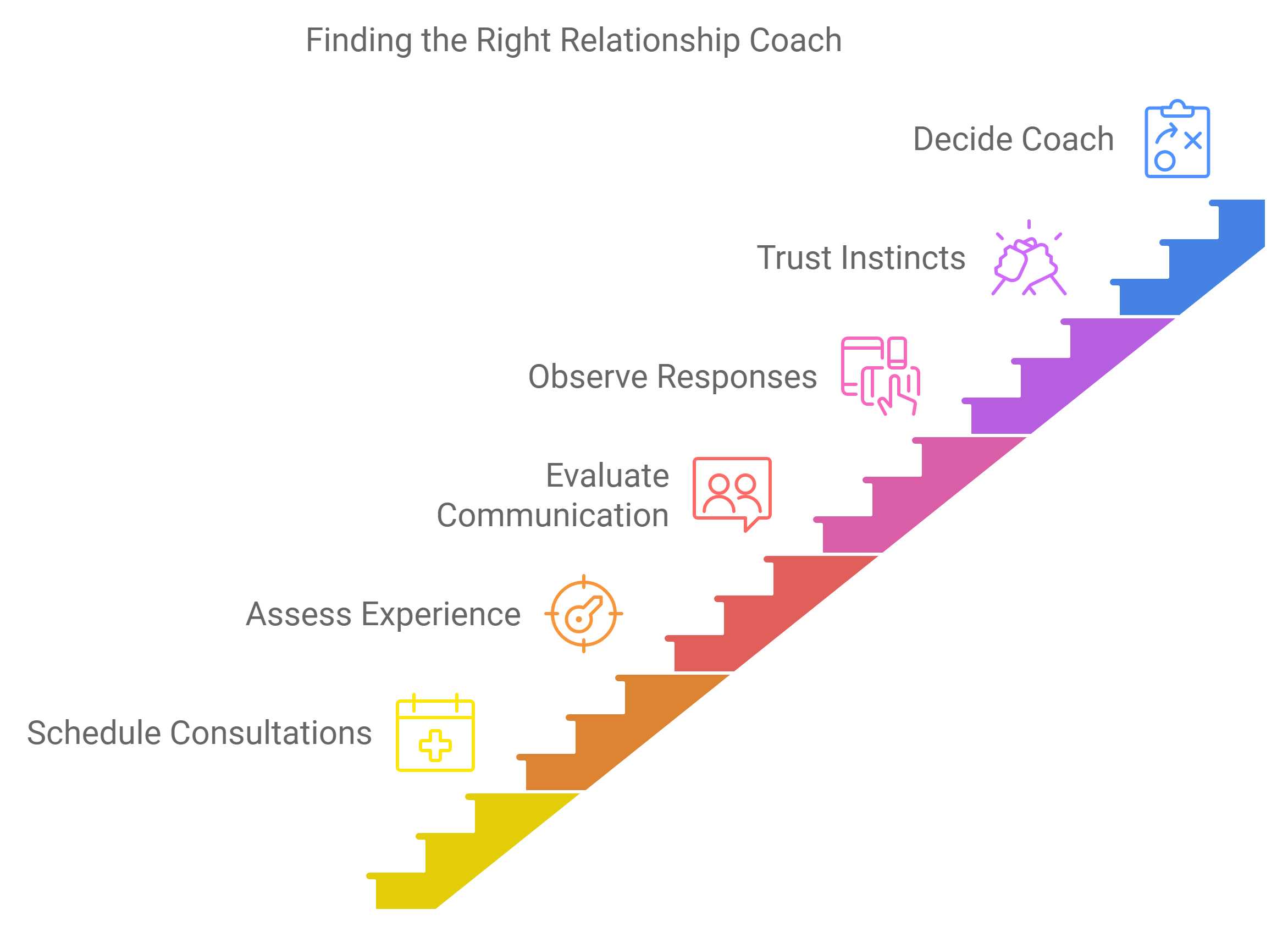
Set Clear Goals For Your Relationship Coaching Journey
Setting clear goals is a fundamental step in the process of relationship coaching. It allows you to track your progress and measure the effectiveness of the coaching sessions. Knowing what you want to achieve will also help you and your coach tailor your sessions accordingly.
Here are some key points to consider when establishing your coaching goals:
| Goal Type | Description |
|---|---|
| Specific | Clearly define what you want to achieve. For instance, improving communication skills or resolving trust issues. |
| Measurable | Ensure you can track your progress, whether it’s through feedback from your partner or self-reflection. |
| Achievable | Set realistic goals based on your current relationship situation and the resources available through your certified relationship coach. |
| Relevant | Make sure your goals align with your broader life objectives and values, making them worthwhile. |
| Time-bound | Decide on a timeline for each goal. For example, you might aim to improve communication within three months. |
Additionally, communicating these goals with your coach can significantly enhance your coaching experience and ensure that both of you are on the same page. Choosing a relationship coach who actively engages with these objectives will lead to a more productive and fulfilling coaching journey.
By setting clear goals, you’ll be better equipped to evaluate the success of your coaching journey and make necessary adjustments along the way, ensuring that you are constantly moving toward a healthier relationship.
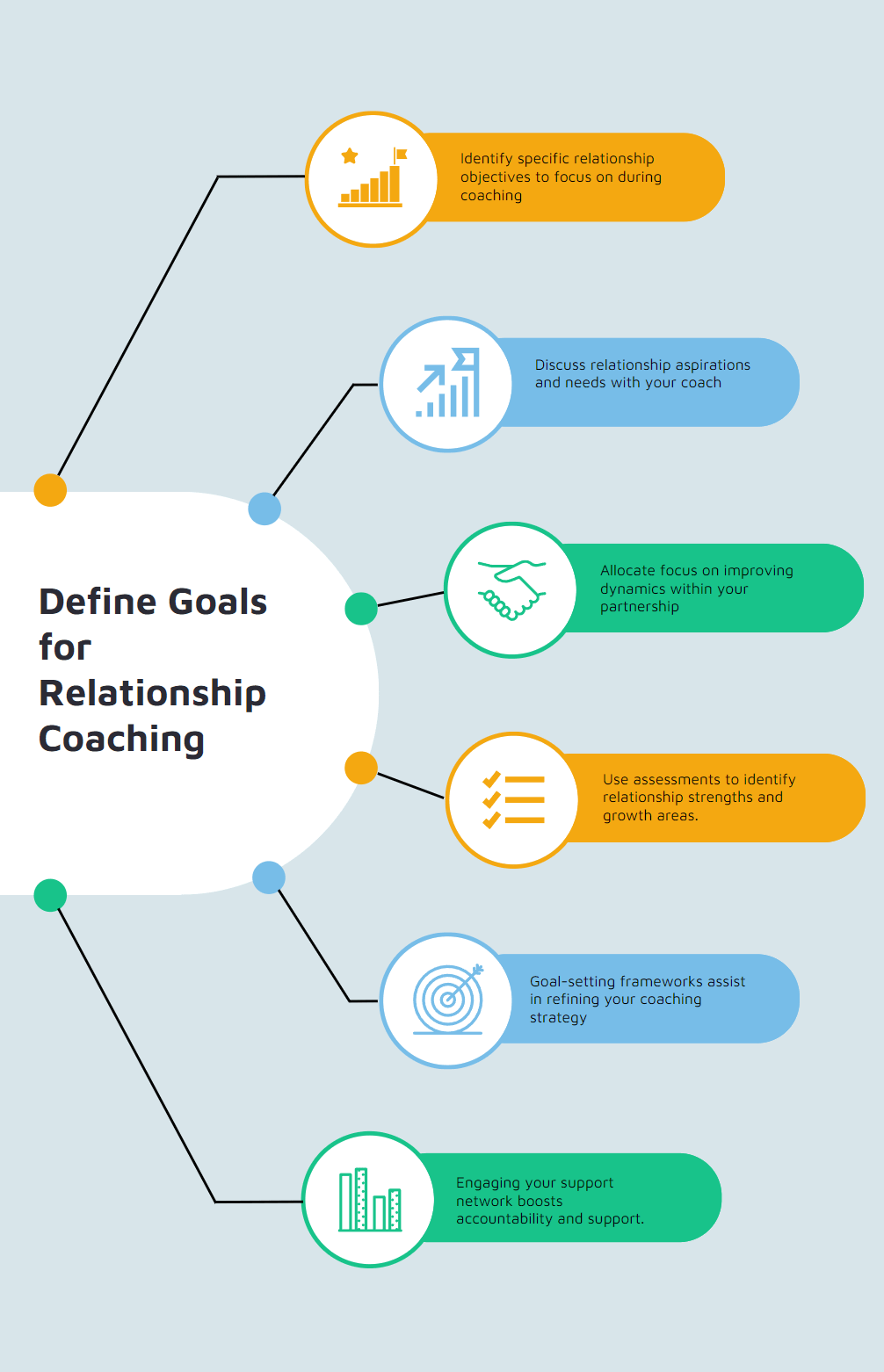
Frequently Asked Questions
What is a relationship coach?
A relationship coach is a professional who helps individuals or couples improve their relationships by providing guidance, support, and strategies to navigate personal and interpersonal challenges.
What qualifications should I look for in a relationship coach?
Look for coaches with relevant certifications, experience in relationship dynamics, and a solid understanding of communication techniques, conflict resolution, and emotional intelligence.
How can I assess a relationship coach’s approach?
You can assess a coach’s approach by reading their website, reviews from clients, and asking them directly about their methods during an initial consultation.
What types of issues can a relationship coach help with?
A relationship coach can help with various issues such as communication problems, trust issues, conflict resolution, dating advice, and navigating breakups or divorce.
Is it necessary to have an in-person session with a coach?
Not necessarily. Many coaches offer virtual sessions via video calls, which can be just as effective and provide flexibility regarding scheduling and location.
How long does it typically take to see results from coaching?
The time it takes to see results varies based on the issues addressed and individual circumstances, but many clients report meaningful progress within a few sessions.
How do I know when it’s time to seek a relationship coach?
Consider seeking a relationship coach when you feel stuck in recurring patterns, experiencing significant conflict, or wanting to improve your relationship dynamics but don’t know how to start.















[…] the use of relationship coaching techniques, individuals can unlock greater levels of emotional intelligence. This expanded emotional awareness […]